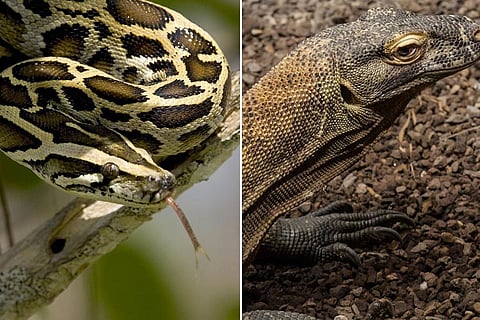

A few environmentalists from north Kerala have launched campaigns to stop crimes against lesser known wild animals as part of National Wildlife Week. All wild animals are hunted but some of the endangered species are being killed without the perpetrators facing any legal actions.
Apart from tigers and elephants, monitor lizards and pythons are also animals protected under schedule 1 of the Wildlife Protection Act. But the hunting of these reptiles is less noticed, say environmentalists.
"Hunting of these reptiles can take place easily as they are found in villages. Poaching a tiger or an elephant is not simple. Some kill these reptiles as easily as they go fishing," Kasaragod District Range Forest Officer N Anilkumar observes.
Monitor lizards and pythons are largely hunted for their meat and skin.
"Many of these lizards are found in my rubber plantation. My labourers there used to kill and cook the lizards. They do it as a group comprising a few locals and share the meat," a person who owns a plantation near Manjeswaram in Kasaragod district tells TNM.
He says that it is not easy to kill a monitor lizard.
"Recently, they caught two such reptiles which were more than six kilograms each. Monitor lizards don't die easily. They are killed by hitting sharp stones on their heads. It's a cruel act and difficult to watch," he adds.
He also says that many families living nearby cook the meat supplied by the workers living in his plantation. Since the locals are also involved, nobody informs the Forest Department about the crime.
"These days, the animals come out in broad daylight to find food, which makes them easy prey. Since monitor lizards are not as huge as elephants or tigers, nobody will know if they're hunted," E Unnikrishnan, a renowned environmentalist based in north Kerala, says.
Apart from the meat, monitor lizards are also killed for their skin. "The skin is used to make some musical instruments. We captured such instruments from a shop in Kannur some time ago," Thaliparamba Range Forest Officer KV Jayaprakash says.
N Anilkumar claims that nomads from other states also come to Kerala to poach such less noticed animals. "They might come here to sell something. But one time I followed them and found that they catch these animals too," he says.
Malabar Awareness and Rescue Center for Wildlife (MARC), an NGO based in Kannur district, has been campaigning during Wildlife Week to protect monitor lizards.
"These lizards are necessary to balance the food chain in Nature. Their numbers are decreasing considerably. If proven guilty of hunting them, one can get up to seven years of imprisonment and a fine," Niyas Mangad, an activist at MARC, says. He adds that a lot of people love to eat the meat of the lizard.
The situation is similar with pythons. They are hunted for their meat, skin and fat. "Pythons are actually helpful reptiles. They don't hurt humans but they are widely hunted," Niyas says.
Jayaprakash says that pythons are fast disappearing.
"These reptiles will not stay inside the forest as they won't get enough food there. So, they become easily accessible to poachers," he notes.
N Anilkumar points out the need to create public awareness about these animals and how they are becoming endangered.
"People don't know that these animals are as important to our wildlife as all other wild animals. Creating proper awareness will solve the issue gradually. There are certain groups who regularly inform the Forest Department about such illegal catches," he says.
However, officials can take action against these crimes only if they have material evidence. So, when animals are killed and eaten, there remains no evidence and very few cases are registered.
"In most of the cases, the offenders will not leave any trace of evidence. Cooked meat, animal remains etc can be considered material evidence," Jayaprakash says.